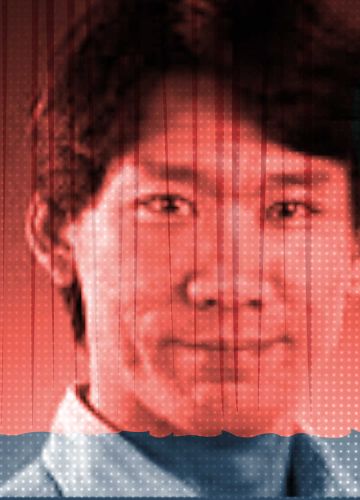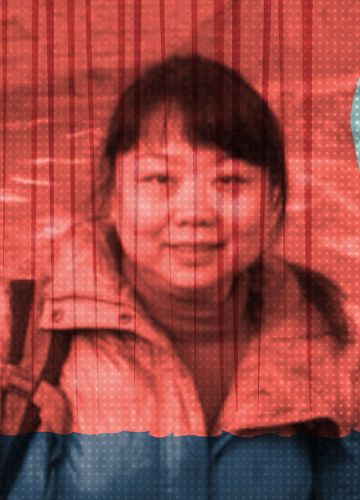Using Podcasts to Speak a New Language

Fang Kecheng

Zhang Zhiqi
In October 2022, the Chinese University of Hong Kong’s (CUHK) School of Journalism and Communication debuted its Media Professionals in Residence Programme. One of the first visiting fellows was Zhang Zhiqi (张之琪), a former professional journalist who, together with Fu Shiye (傅适野) and Leng Jianguo (冷建国), co-founded the Stochastic Volatility (随机波动) podcast, the most popular podcast on China’s Universe (小宇宙) podcast app. As of December 2022, the podcast had around 440,000 subscribers.
CUHK: How did you get into the media industry?
Zhang Zhiqi: I did my first media internship at the Beijing News Book Review Weekly (新京报书评周刊) during my first summer holiday at Columbia University. This was originally a supplement published in the newspaper once a week, but with the introduction of new media platforms like WeChat, it started to run a public WeChat account that was updated daily by a small editorial team of three.
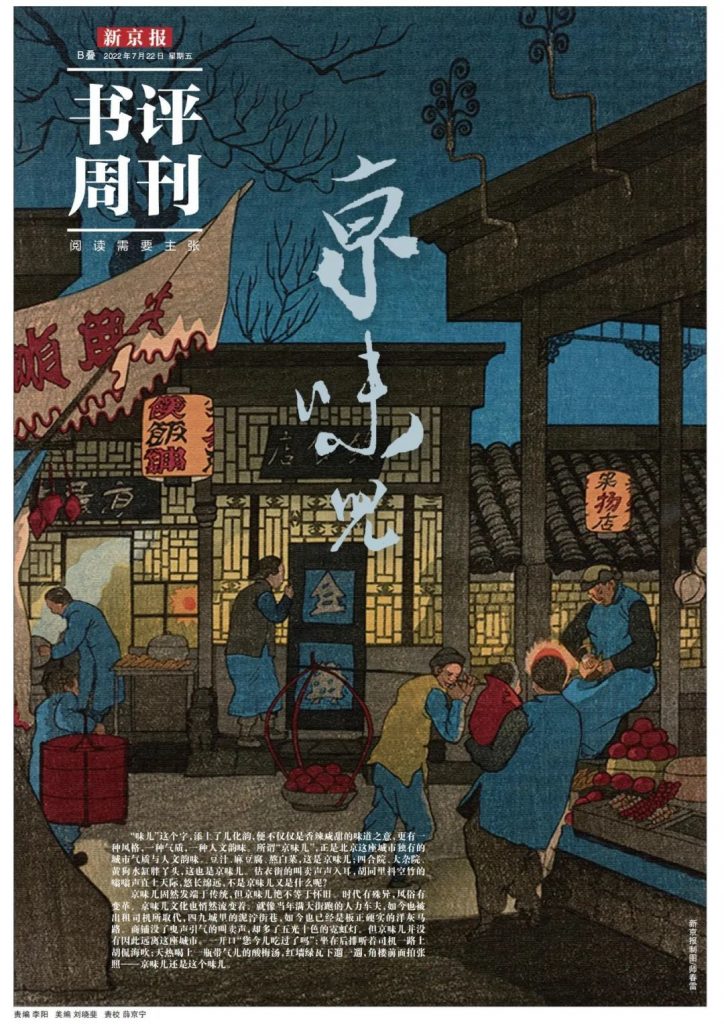
I didn’t actually know much about the news business before this point. Like my classmates, I was largely confined to the ivory tower, only paying attention to what happened on campus or within broader academic circles. I wasn’t even that interested in news reporting. But the changes and proliferating content brought on by new media made publications like the Beijing News Book Review Weekly and the Shanghai Review of Books (上海书评), which straddled academia and media, possible. Some focused on social issues and some interviewed scholars or focused on academic affairs. I chose to intern at the Beijing News Book Review Weekly because I was also a reader.
After I graduated and returned to China, two editors from the Beijing News Book Review Weekly moved over to Jiemian. They started a culture desk there and so I joined them.
CUHK: How was culture reporting done at Jiemian News?
Zhang Zhiqi: Since Jiemian is an online media outlet, there is pressure for clicks. Reporters are encouraged to chase trending topics, hoping this will produce a “hit.” If a clear photograph of the moon emerges online, for example, this qualifies as a hot news topic and we have to think of a way to interpret this from a cultural perspective. If a story about gene editing comes out, we have to do the same. This kind of culture reporting is quite different from that done in newspaper supplements; it’s more like commentary or opinion.
CUHK: With the space for news reporting in China constantly shrinking in recent years, do you think that culture reporting has a special role to play?
Zhang Zhiqi: There’s a social or political side to most of what we wrote, but I think that a lot of the time we adopt a strategy of “[polishing jade with] the other mountain’s stone” (他山之石). When we discuss issues in China you can’t do so directly, or there just isn’t enough material to support you.
At the same time, let’s say we know this issue has an analogue in America or Japan, and that in those countries there is research and media reports you can consult. We’ll devote a lot of space to these and maybe at the very end draw it back to China. Or we’ll speak in historical terms before finally mentioning the present. Most of the content in between will be devoted to things we do have solid information and research about and in the conclusion we might include something more closely related to reality. That’s how it goes, most of the time.
Let’s say we know this issue has an analog in America or Japan… We’ll devote a lot of space to these and maybe at the very end draw it back to China. Or we’ll speak in historical terms before finally mentioning the present.
CUHK: What have you written about domestic politics or systemic issues that has left a pretty deep impression?
Zhang Zhiqi: Once, before a Victoria’s Secret show in China, a model made a squinty eyes gesture online and I wrote an article on stereotypes about Chinese women in Western culture. I brought up a number of classic examples like Madam Butterfly and Anna May Wong, then fashion phenomena like an exhibition about China on at the time at the Met that was called “China: Through the Looking Glass” and featured some aspects of cultural misappropriation and the orientalist gaze.
That was in 2017-18, before the ruhua (辱华, “insulting China”) nationalist frenzy truly took off, but I did get to touch upon this at the end of the piece. Basically, I made the point that if the world’s current biggest market and second-biggest economy were to hit back against this, that would be a mistake, because it’s a historical problem. There is orientalism in this historical problem, but that can’t be addressed by economic means or voting with your money. Also, if you go around saying, “This isn’t China,” then what is China? You need to produce a new narrative. What exactly will this narrative be? Is it just that we’re richer and stronger and louder now? There has to be something new.
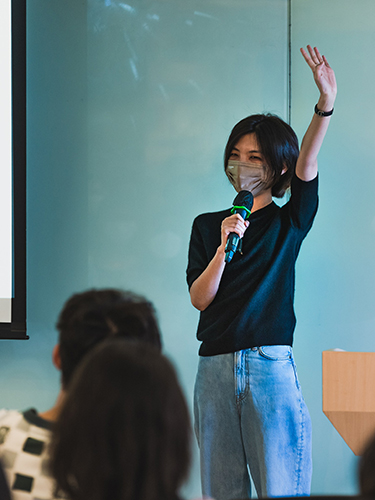
At the end of the article I discuss the nationalist wave but this is only the last one or two paragraphs. The 4,000 characters before that are all about history.
CUHK: Can we say that with the space for traditional investigative reporting being squeezed, culture reporting has become the new forum of public discussion?
Zhang Zhiqi: I think this is true to a certain extent. There’s a higher threshold to these pieces because they tend to be longer and more theoretical, like theses. So I reckon there aren’t as many people really reading these articles as we may think. They do have some influence within the realms of media professionals and educated readers in first-tier cities, however, and can play a role in clarifying some issues or tracing them back to their source.
The Space for Gender Issues
CUHK: Gender issues are one of the main topics you discuss both in Jiemian and on Stochastic Volatility. What prompted you to focus on this issue?
Zhang Zhiqi: Actually, it was only after I started working that I began to pay attention to it. You could say I’m a relatively privileged woman; I was lucky enough not to have strongly felt the impact of gender inequality in my academic career. After I started working, though, it became clear I would encounter a lot of unfair treatment and explicit or implicitly discrimination as a woman. My own experience and the many incidents I experienced over these years made me pay closer attention to this issue.
CUHK: Looking back, do you think that how you write about gender issues has changed over time?
Zhang Zhiqi: At the beginning I wrote things that are common knowledge. For example, I remember I wrote an article about rape culture after a popular science KOL talked about rape on a variety show and how he’d almost become a rapist. He said all men were potential rapists because they have sexual urges and these urges could lead to rape in particular circumstances. In other words, he was saying rape had biological reasons. He acted as though he was saying this to protect women and to reminder them to be careful but actually he was imparting a huge misconception.
The article I wrote at the time looked at studies abroad on convicted rapists’ hormone levels and sexual relationships, proving that rape has nothing to do with whether one is sexually active or has a partner. A lot of my earlier work was like this. Later on, I began to take a more microscopic look at individual women’s lives. I think that this is related to the development of the movement as a whole.
CUHK: Does writing about gender issues run the risk of being censored?
Zhang Zhiqi: A lot of the time people say that gender issues are the only thing you can talk about today. Indeed, the space for this topic is much bigger than a lot of others. There’s a lot that hasn’t been explored yet and a lot you can write about. But of course censorship on the issue is a lot more stringent now than it was five years ago.
There’s a lot that hasn’t been explored yet and a lot you can write about, but censorship of the issue is a lot more stringent now than it was five years ago.
CUHK: Has this increased censorship had an impact on your work? Does it bear any relation to why you left Jiemian?
Zhang Zhiqi: Actually, while I was working at Jiemian at the time there was relatively more room to manoeuvre on gender issues. For example, I wrote an annual run-down of related news for several years and it wasn’t too heavily censored. Run-downs generally aren’t regarded as that dangerous, but even though they don’t involve going to do interviews or exposing anything they’re still dangerous for editors. They’re tantamount to putting together all the bad things for people to see. The first and second years I did this I didn’t feel too much pressure. At most, our leader might say we might not post it to our app. They did another run-down in 2020, the year after I left, but did not do one in 2021. That is to say, it’s no longer possible.
Reasons for Starting the Podcast
CUHK: Why did you decide to begin podcasting with Fu Shiye and Leng Jianguo after leaving Jiemian?
Zhang Zhiqi: At the time, we had a former colleague named Cheng Yanliang who left Jiemian a year before us and started the podcast Left-Right (忽左忽右). In 2019 he came to see us in Beijing and said that the three of us were always discussing things and we might as well record it and turn it into a program. I was already preparing to resign at the time but I was going to go find another job. We decided to give it a go but didn’t take it too seriously. The market for podcasts hadn’t really gotten off the ground yet so we didn’t think we could make a living out of it.
It was clear, then, that the audience for the written word was getting smaller. When I first went out to do interviews with scholars or authors who were promoting their new books, publishers used to ask which journalists could shoot video. By the time I left, they’d ask which journalists couldn’t shoot video. You realize that all your colleagues are shooting video and then you get the distinct sense that audience growth for written content has stagnated.
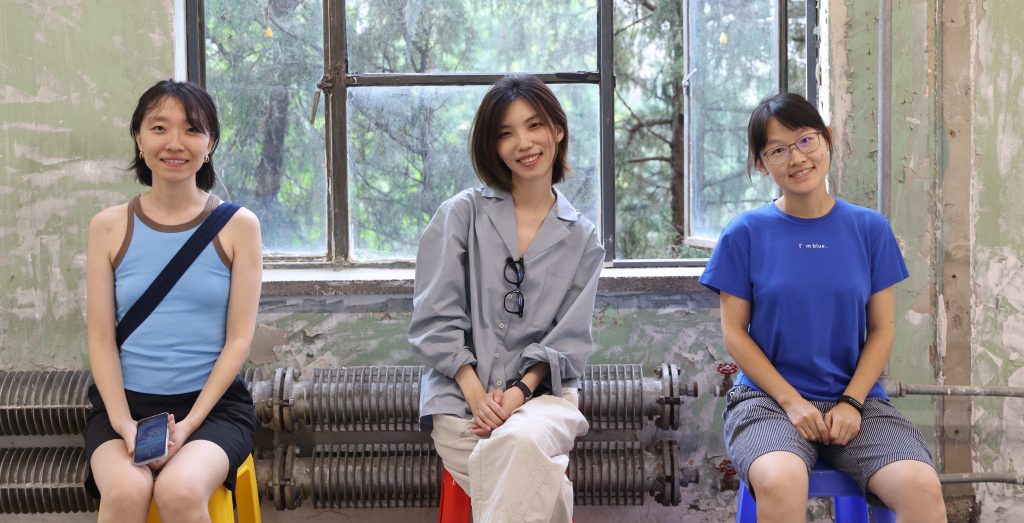
CUHK: Can you see this trend in the numbers?
Zhang Zhiqi: You can see on public WeChat accounts that the number of people reading articles has dropped. Whereas they had been climbing earlier, now they’ve either stagnated or fallen. At that time, I was a bit anxious about my career. I thought that there would be no more people reading our long articles and that we would lose our audience.
CUHK: Besides the fall in readership, the market for podcasts was also developing. Were there things you thought you could do with audio that you couldn’t do with text?
Zhang Zhiqi: At the beginning I just thought about it in terms of taking a written draft and turning it into an audio program. Because at that point when we discussed a topic we would prepare carefully and write down everything we wanted to say before recording that and pushing it out. A lot of our earlier were like this: picking a topic, doing research, analyzing it from a cultural perspective and dividing the work between the three of us.
CUHK: Do you have more space to explore these issues through podcasts than you did writing for Jiemian?
Zhang Zhiqi: Yes. We were on some domestic platforms at first like NetEase Cloud and Himalaya. With the state of censorship technology at the time, there was no pre-censorship — you could directly publish content. Written texts could be instantly scanned for problems but audio took more time, so there was more freedom.
CUHK: Were there many gender issues podcasts in China at the time?
Zhang Zhiqi: Not many. Since most podcasts were hosted by men or a mix of men and women, like two men and one woman or one man and one woman. Podcasts hosted entirely by women were a rarity.
CUHK: Do you recall what your first episode was about?
Zhang Zhiqi: We recorded the first episode after Spring Festival in 2019. It was called “Sexy Women Aren’t Funny, Funny Women Aren’t Sexy?” We were talking about whether female comedians are always limited by gender stereotypes, and whether a beautiful and sexy woman is considered not funny. If you were a female comedian, would you just naturally be considered unattractive and unsexy?
CUHK: Was there a reason you decided to persue this topic?
Zhang Zhiqi: 2019 was when standup comedy started to become popular in China. The show The Marvelous Mrs. Maisel was very popular online while on CCTV’s annual Spring Festival Gala actresses like Cai Ming and Song Dandan seemed to be performing stereotypes. These various elements were all mixed together.
CUHK: Later, in February 2020, you talked about “Plague, Language, and People in Particular” (瘟疫、语言与具体的人) with Luo Xin and had your account terminated. How did you start anew and decide to do a new program?
Zhang Zhiqi: I spent two days crying in bed when it happened. I didn’t understand why. It was like a child I worked so hard to raise up was suddenly taken away from me. But this feeling passed. You have to keep going.
CUHK: Where did the new podcast differ from your previous one?
Zhang Zhiqi: I don’t think it did. I think it’s probably just that we still wanted to continue doing the podcast. At that time, our WeChat account didn’t get blown up due to that episode and a lot of people went to follow it. So we told everyone on WeChat that we were back again. There was also the Universe app that happened to be launched at that time, so we decided then to distribute our show only on ubiquitous podcast apps (i.e. apps like Apple Podcast, Overcast, etc. that crawl content via RSS).
Sharing Feelings with Sound and Creating a New Language
CUHK: What is it like to change from a writer to working in audio?
Zhang Zhiqi: First of all, you’re exposing yourself personally to a much greater degree when you’re podcasting. As a reporter, people just see your words. They don’t hear your voice or see your face. And because you have an organization in front of you you don’t need to directly face readers. You may face criticism from your superiors but the public.
But with audio you are publishing yourself. The audience hears my own views, not those of my institution, and I can only speak from my own perspective. The listener gets to hear my voice and they actually get to know me a lot better than if they just read my words.
Secondly, podcasts produce a greater sense of intimacy. One listener told me that every time they hear us say “bye-bye” at the end of an episode they’ll say it back. And lots of people listening to us in their living room or dining room or kitchen will get the feeling that we’re right there with them.
CUHK: A lot of the time your show also uses the intimacy of the medium your feelings about a particular topic. For example, when people wrote in to share their frustration during the Covid-19 pandemic, it was a venue both to share feelings and to talk about pandemic response policy issues.
Zhang Zhiqi: When we have no way to directly discuss an issue, what extension can we use to talk about it? I think it’s a bit like throwing a stone into the water and making the water ripple. Maybe a small number of people will be hit by the stone directly but the ripples will reach many more. There could be no way for us to talk about the stone directly and doing so could result in not being able to do the podcast anymore. We want to talk about the stone eventually but talking about the ripples lets to continue to do the show. It’s like circling a black hole. You know you don’t get into it so you have to keep going around and around.
It’s like throwing a stone into the water and making the water ripple. Maybe a small number of people will be hit by the stone directly but the ripples will reach many more. There could be no way for us to talk about the stone directly and doing so could result in not being able to do the podcast anymore.
It’s somewhat of a cyclical thing. You get to a certain point where you feel that you have to go in, even if it’s a little bit risky, because if you go around it again you’ll go crazy. Maybe in our show there are waves like this. People might not see it, but we have these waves inside us: we do a few episodes covering unimportant topics that we don’t want to do because we can’t think of a way to cover a particular issue.
Then we might let it go, or maybe we’ll be down for a while, and then we’ll find out that there’s a way we can do and get a little bit more political, and we think that it’s OK to say what we want. After we’ve done it, we’re briefly healed a bit, we feel a little bit better. Then it starts over again.
For example, a few months ago we published an episode called “The Annihilation of Sex.” You can’t talk directly about the issue itself, but it’s closer to the issue itself than others. We are actually talking about the issue of sex in a totalitarian system, and then about the totalitarian system itself. After we do that, we’ll feel better. Then maybe in the next few episodes, we’ll just talk about unimportant things.
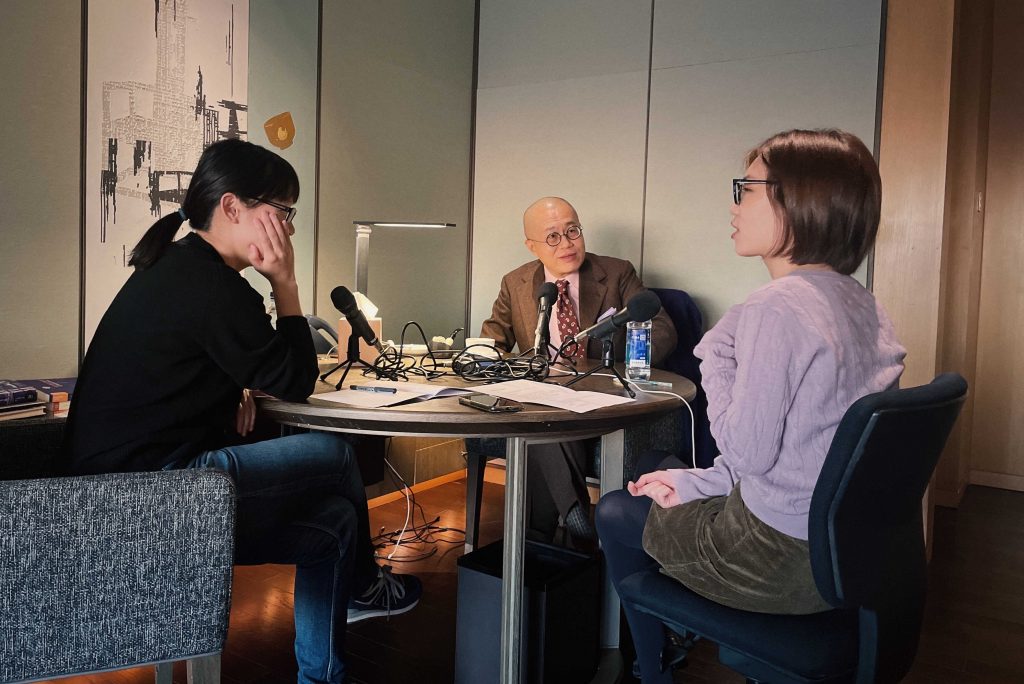
CUHK: How would you respond to the charge that this is just surrounding yourself with a comforting echo chamber and doesn’t actually change anything?
Zhang Zhiqi: I wonder about this myself, sometimes. In our episode with Yuan Changgeng, he said that we resist now by building up our own private lives: eating well, growing flowers, living a good life. I also questioned him. I asked, “so you’ve built up your personal life but what about when you’re burgled and killed one day — isn’t your private life fragile?”
I can say there’s value in us doing all these things, but I don’t think that this is all we can do. Of course I know we should do more. I can’t say this is enough and we just have to accept the world as it is. But at the same time this isn’t just a medium or a means for you to speak. It’s your job, your income source. I wouldn’t say that it’s more important to protect it because it’s a battle position, which I think is also hypocritical.
You have to acknowledge that you have personal need in all this. You need to be safe, you need to earn money, you need to have a stable life. These needs are often greater than what you want to fight for, and I think it’s an honest answer to say that. But on the other hand, I wouldn’t say we’ve done all we can. You can definitely do more; it’s just a question of whether you’re willing to pay the price to do it.
CUHK: Is it a strategy for you to discuss gender issues frequently? Or is it simply because awareness of gender issues is becoming more and more important and the topic is worth discussing so frequently?
Zhang Zhiqi: Definitely the latter. I never thought that this is the only thing we’d talk about. Gender issues are the topic most closely connected to me and naturally it’s related to my gender. It’s intrinsically tied to my existence. It’s not a strategy, it’s something we care about. Like [Japanese feminist] Chizuko Ueno said, when she was fighting alongside with her male classmates she clearly felt that she was treated as a sexual object or was being highly sexualised, that she was not an equal to them. I think this is what many women feel on a daily basis. Even though we are in a context of resistance to totalitarianism, women still have these feelings. I think often talking about this is the first thing we feel.
Not only do these feelings lack a channel to be told, but they also lack a model to be understood. I think there is a need to invent a new way of telling it, to invent a new language to tell it, in order for it to escape from the established narrative.
Not only do these feelings lack a channel to be told, but they also lack a model to be understood. I think there is a need to invent a new way of telling it, to invent a new language to tell it, in order for it to escape from the established narrative. In fact, we have all been brought up with such a narrative. Our feelings are actually cultivated from an early age in a framework where male feelings are the main focus, and it is a process of passive acceptance of how women should understand your place in the world.
We are actually in the process of inventing a new language to speak about this. The process of invention is very difficult. And it’s a real creation — which is to find a new language in which to speak about it from a wasteland where there is nothing. You talk about your feelings, perceive your feelings, and then how do you think about your relationship with everyone in the world, with men or with women? You need to create a whole new system.

Fang Kecheng

